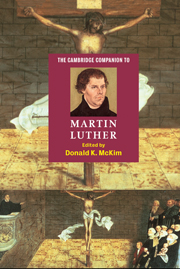16 - Luther and modern church history
from Part IV - Luther today
Published online by Cambridge University Press: 28 May 2006
Summary
There are at least two respects in which this subject can easily conceal more than it elucidates. The more obvious of these is the all-too-tempting impetus to ascribe to Luther everything in contemporary Christianity of which the author approves. This tendency is most obvious in the pictures of Luther that derive from German Protestants and Lutherans in particular. Thus, Luther was depicted in his own time as the one who, by the grace of God, recovered the gospel from centuries of neglect and abuse. In the seventeenth century Lutheran Orthodox theologians valued him as the one who taught the true collection of doctrines with which they associated true Christianity. Later Pietists found in him the Christian man of great interior faith, the Rationalists of the eighteenth century hailed him for freeing the human intellect from medieval superstition, and more Romantic thinkers of the nineteenth century saw him as the stalwart German who freed Germany from papist, that is Italian, cultural tyranny. More recent times have celebrated Luther the existentialist, enlisted his support for the National Socialist regime of Adolf Hitler and its anti-Semitic atrocities, and even singled him out, along with Albert Einstein, as one of the great raw intellects in the history of the Western world. The other pattern, which goes almost without repeating, is that by contrast both former and latter-day opponents of Luther have found in him all the characteristics of whatever they have identified as most loathsome in their own time.
- Type
- Chapter
- Information
- The Cambridge Companion to Martin Luther , pp. 259 - 271Publisher: Cambridge University PressPrint publication year: 2003
- 1
- Cited by



